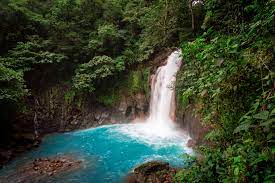Where are they? Alfred Stites and Costa Rica
MSI Press authors are located all over the world. Getting to know the authors can also mean getting to know a new part of the world. We will be sharing this information on a regular basis. Follow us and map our authors' locations.
The late MSI Press author, Alfred Stites (Forget the Goal, the Journey Counts), spent his retirement years in Costa Rica (lit. rich coast) before moving to New Mexico with his children in his 90th decade. After leaving Costa Rica, he wrote a book, Sidewalks in the Jungle, to tell others what Costa Rica is really like.
Costa Rica was the point where the Mesoamerican and South American native cultures met. The northwest of the country, the Nicoya peninsula, was the southernmost point of Nahuatl cultural influence when the Spanish conquerors (conquistadores) came in the 16th century. The central and southern portions of the country had Chibcha influences. The Atlantic coast, meanwhile, was populated with African workers during the 17th and 18th centuries.
As a result of the immigration of Spaniards, their 16th-century Spanish culture and its evolution marked everyday life and culture until today, with the Spanish language and the Catholic religion as primary influences.
Dance-oriented genres, such as soca, salsa, bachata, merengue, cumbia and Costa Rican swing are enjoyed increasingly by older rather than younger people. The guitar is popular, especially as an accompaniment to folk dances; however, the marimba was made the national instrument.
In November 2017, National Geographic magazine named Costa Rica as the happiest country in the world, and the country routinely ranks high in various happiness metrics. The article included this summary: "Costa Ricans enjoy the pleasure of living daily life to the fullest in a place that mitigates stress and maximizes joy." It is not surprising then that one of the most recognizable phrases among "Ticos" is "Pura Vida", pure life in a literal translation. It reflects the inhabitant's philosophy of life, denoting a simple life, free of stress, a positive, relaxed feeling.] The expression is used in various contexts in conversation. Often, people walking down the streets, or buying food at shops say hello by saying Pura Vida. It can be phrased as a question or as an acknowledgement of one's presence. A recommended response to "How are you?" would be "Pura Vida." In that usage, it might be translated as "awesome", indicating that all is very well. When used as a question, the connotation would be "everything is going well?" or "how are you?"
Costa Rica rates 12th on the 2017 Happy Planet Index in the World Happiness Report by the UN, but the country is said to be the happiest in Latin America. Reasons include the high level of social services, the caring nature of its inhabitants, long life expectancy and relatively low corruption.
Check out more information on Wikipedia, which has quite an extensive description of Costa Rica -- or read Alfred's book.
Get to know Alfred HERE.
To find out more about the locations of other authors, click HERE.
in exchange for reviewing a current or forthcoming MSI Press LLC book?
Contact editor@msipress.com.
Want an author-signed copy of this book?
Purchase the book at 25% discount (use coupon code FF25)
and concurrently send a written request to orders@msipress.com.
You can! Find their contact information on our Authors' Pages.




Comments
Post a Comment